Insight: How Scottish fishing is being sunk by red tape since Brexit
Now - just a fortnight after the UK left the EU - he is sitting with two tonnes of live langoustines in a tank and no idea if will be able to get them to the continent. The fishing boats he buys from are tied up in the harbour; and his customers, who are waiting for unfulfilled orders, are no doubt casting around for other suppliers.
“Have my worst fears been realised? Aye, you could say that. We have been talking about this for a long time, but nobody listened,” he says.
Advertisement
Hide AdAdvertisement
Hide AdBack in September, Hughson’s dire predictions were based on the spectre of a No Deal. He told me the trade tariffs - which would have been between two and 20% for seafood - would be just about manageable, but the increase in paperwork - in particular the requirement for both Export Health Certificates (EHCs) and Catch Certificates - would not.
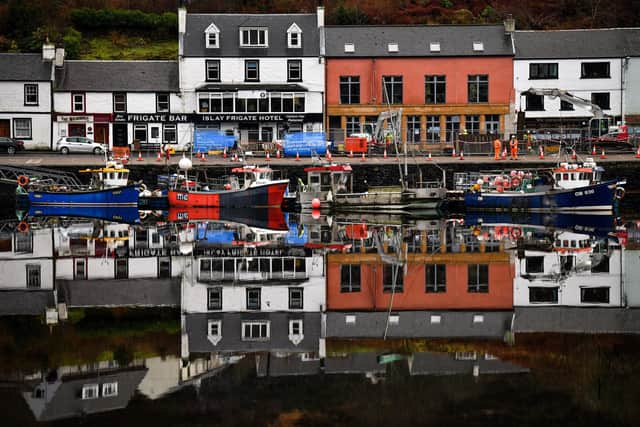

“It’s supposed to be all singing and dancing, but governments are notorious for catch-all systems which don’t do what they are supposed to,” he said then.
And so it transpired. In the end, a last-minute deal, which allowed tariff-free trading, was clinched on Christmas Eve but it did not eliminate non-tariff barriers. Worse still, the 206-page Border Operating Model - which sets out the hoops seafood companies have to jump through in order to export to the EU - was not published until 6pm on Hogmanay, just six hours before they were due to come into force.
The effect has been disastrous: lorries stuck in central distribution hubs in Scotland while paperwork is processed, or on other stages on the journey, as the stock deteriorates inside. Some of the limited produce that has made it across the Channel has been rotten by the time it arrived. The price of fish has plummeted by up to 80 per cent at the market in Peterhead. Some companies have lost thousands of pounds; others, tens of thousands; a few, hundreds of thousands.
Most smaller vessels have stopped fishing, while a number of larger ones have been landing their catches in Denmark, effectively cutting Scottish processors out of the chain. It didn’t help that fishing minister Victoria Prentis admitted she hadn’t read the deal on Christmas Eve because she was too busy organising her local nativity trail, or that George Eustice, Secretary for the Environment, Food and Rural Affairs, referred to the system meltdown as “teething problems”. Tempers frayed, with at least one shellfish producer - Jamie McMillan of Loch Fyne Seafarms and Loch Fyne Langoustines - pledging that, if he couldn’t get his produce to market this week, he would dump it at the gates of Downing Street.
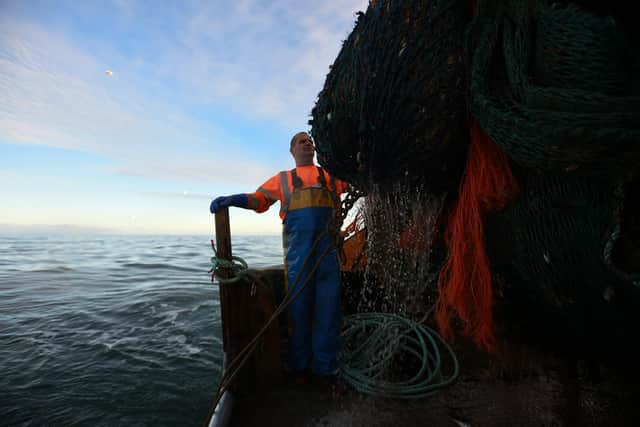

Donna Fordyce, chief executive of Seafood Scotland, believes the industry is at breaking point. “If this cannot be quickly resolved, we will see companies closing, we will see some of the fleet going out of business,” she says.
“They have already had the pandemic to deal with. They have had all the markets closing or vastly reducing. They have been trying to deal with Covid within the factories, working under new settings, with reduced productivity as a result of social distancing, and then the border delays or closure over Christmas, which is peak time, particularly for shellfish companies.
“They’re in a very precarious state. There’s no resilience left. Whatever reserves they had have been eaten away.”
Advertisement
Hide AdAdvertisement
Hide AdKeltic Seafare has certainly had its struggles. Last July, it made 10 employees - 45% of its workforce - redundant, a tough decision taken on the back of years of Brexit uncertainty and months of lockdown. And now this.
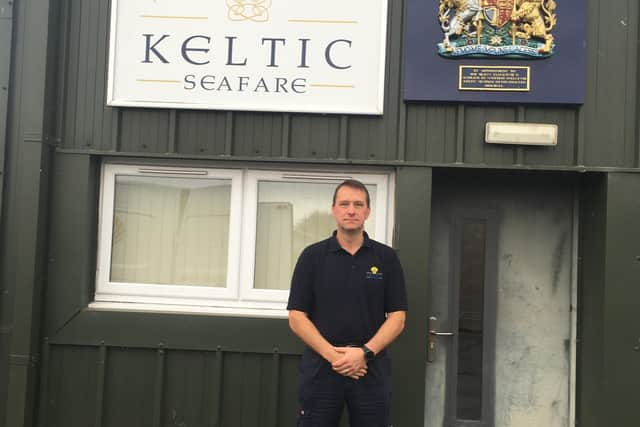

Hughson exports his langoustines through associated seafood company DR Collin & Son in Eyemouth, but he hasn’t sent any EU consignments from Dingwall since January 1 because he realises they are unlikely to reach their destination.
“DR Collin tried to export a small amount of product last week,” he says. “It was weighed and packed on the truck, ready to go, bound for Boulogne-sur-Mer, but the truck didn’t even get out of the yard.
“The environmental health officer was there. The goods made it through the inspections, but when it came to using the online government system, things started to unravel very quickly. They kept getting rejected even though, as far as they were concerned, they were using the information they had been told to use, the information they had been given by the Department of the Environment, Food and Rural Affairs [DEFRA].”
Hughson is comparatively lucky. Keltic Seafare is unusual in that it has the capacity to store large quantities of live langoustines for a short period of time; but it won’t be long before he is forced to kill them and sell them as fresh or frozen, significantly reducing their value.
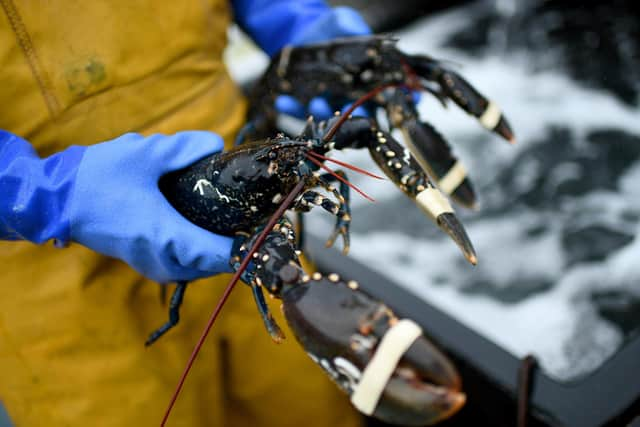

“We are already losing money every day, as are the fisherman who are supplying us. Everyone in the chain is losing money,” he says.
As for DR Collin - Eyemouth’s biggest employer - it is unsure of its future. “This has more or less finished the business,” its managing director James Cook told Representing Border. “We can’t sell anything.”
One of the key selling points of Brexit was that it would be good for the fishing industry; once out of the EU, we would take back control of our waters. This line was still being promoted late last week. Even as chaos reigned, leader of the House of Commons, Jacob Rees-Mogg, was telling a near-empty Chamber our fish were now “British fish and better and happier for it”.
Advertisement
Hide AdAdvertisement
Hide AdBut the industry doesn’t see it that way. Boris Johnson hailed his last-minute deal as a triumph, but the fishermen accused him of selling them short. After a five-year transition period, the EU catch will be reduced by 25 per cent, far short of the 60 per cent cut the UK was asking for. Meanwhile - as forecast - the non-tariff barriers are crippling.
This is particularly damaging for Scotland, which has 70 per cent of the UK’s total fishing fleet and is responsible for 98 per cent of the UK’s salmon production. The seafood industry contributes £301m to the economy and provides almost 5,000 jobs. This may not seem hugely significant, but fishing tends to be centred in areas which have few other opportunities.
“Seafood is a product that needs to complete the journey from the North-East or the West coast of Scotland into markets in France and Spain in 24 hours,” says James Withers, CEO at Scotland Food and Drink.
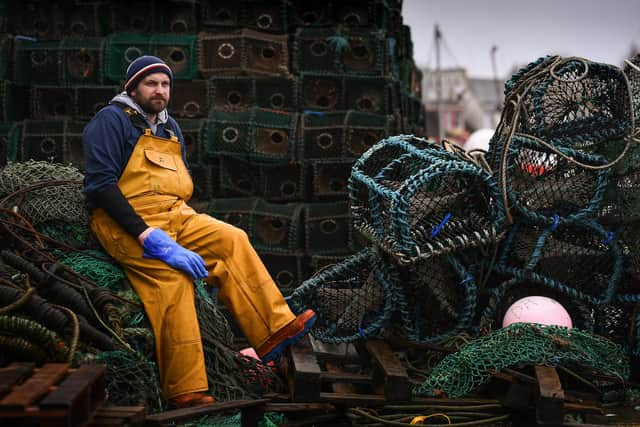

“But we have gone from the point where a product would have had a single short form with it, to there being 18 different steps that an exporter has to go through alongside another eight steps an importer has to go through.
“We have a new multi-million pound trading system that hasn’t been tested, so companies are struggling to get their heads around the paperwork. There have been problems finding the right product code - for example, the government doesn’t appear to have a product code for monkfish tails, or it does one day and doesn’t the next.
“The systems used by some of the logistics firms haven’t been talking to the UK government systems and the UK government systems haven’t been talking to the French systems even to the point where there was one debate over whether forms should be filled out in red ink or blue ink and another on whether 15-page export certificates need an official stamp on all 15 pages or just on the front.”
The situation is exacerbated by the almost universal use of groupage - a system whereby several companies send out small shipments of goods to a range of customers in the same lorry.
In Scotland, most EU seafood exports are sent by groupage through three central distribution hubs - O’Toole in Bellshill, Mesguen in Harthill and DFDS in Larkhall. Of these, DFDS is the biggest, transporting 3,500 consignments a day on 20-40 lorries.
Advertisement
Hide AdAdvertisement
Hide Ad“Mesguen and O’Toole are still doing groupage, but it’s on a pretty small scale - four to five lorries a day,” says Fordyce. “DFDS [which withdrew its groupage service] have said they are going to start back on Monday, but in what volumes I don’t know.”
Post-Brexit, produce bound for the EU requires an EHC in the same way produce exported outside the EU did before. These would normally be provided by environmental health officers or official vets, but it was clear there would not be enough to cope with demand around the country.
So the Scottish Government tasked Food Standards Scotland (FSS) to coordinate efforts at the central distribution hubs where the EHCs were to be issued. This should have speeded things up, but the overall system is complicated and there is so much documentation required.
“We land 65 species,” says Fordyce. “That could go out as fresh, live or frozen; it could go out filleted or whole; one order could involve six different species, but equally an order for one species could come from five different boats, and all of that has all got to be documented: what weight you got off every single boat, how that was processed - it’s very, very complicated.”
With groupage, an issue with one company’s paperwork means delays for everyone else. “DFDS gave me an example,” Fordyce says. “They had a lorry packed and all the paperwork was there, but there was a discrepancy of one and a half kilos between the weight of what was on the lorry and what it said on the manifest, so they had to haul every single good off the lorry to find out where that one and a half kilo error had been made.”
These delays can prove costly. William Calder, director of Scrabster Seafood, lost tens of thousands of pounds on an £80,000 shipment of white fish last week after sending it to DFDS.
“The goods arrived down [in Larkhall] on Monday night [January 4] and on Tuesday night we got an email saying there was an issue with paperwork,” Calder says. “We asked what the issue was and they said there was a form that hadn’t been filled in on time, so we sent them back the evidence to show it had been filled in in November/ December last year, and we never heard back from them, other than to say that the goods weren’t going out that night.
“We tried to contact them all through Wednesday and most of Thursday but we couldn’t get any response. It was so stressful knowing that our stock was there deteriorating day by day.”
Advertisement
Hide AdAdvertisement
Hide AdCalder, whose company employs 20 people, claims he finally received an email telling him DFDS hoped to send the consignment out the following Monday. “But our fish had already been there four days by then,” he says. He arranged instead for it to be transported to Grimsby market where it sold for just £18,000, partly because it wasn’t fresh and partly because megrim - which is highly prized in Spain and Portugal - is not really eaten in the UK.
Calder was told he could export goods again via groupage the following week, “but I wasn’t prepared to play Russian Roulette and send another £80,000 shipment away not knowing if it was going to get through or not,” he says.
So, what can be done? In the short-term, the Scottish government and Seafood Scotland are trying to support companies with their form-filling and documentation. “Some of the companies are really small. They have never had to do the level of paperwork required - it’s overwhelming for them,” says Fordyce.
“We held a seminar involving over 100 companies with DFDS, FSS and the Institute of Export to try to make sure everyone was aware of all the information required. It’s tiny things - like on the invoices you might always have written ‘-002’, but you can’t have that dash now, it won’t be accepted. If you don’t just put ‘002’ the whole load will be rejected.”
Rural Economy Secretary Fergus Ewing has joined industry bodies in calling for the introduction of a grace period of up to six months before the new rules apply. The UK has already offered EU exporters a similar derogation, with no checks on imported goods being carried out until July.
“One of the really galling things in all this is a lot of this paperwork is serving zero purpose because we were operating to full EU single market standards on animal welfare food safety on December 31 and none of that changed on January 1,” says Withers.
“The hope is that, now we have a deal, and we haven’t crashed out with total acrimony, there might be a more benign environment and the possibility of a sensible discussion about whether these checks are benefiting anyone because they are not benefiting the EU customers and consumers who want this product .” They are also lobbying for compensation for all those who have lost out financially as a result of the crisis.
Of course, the process should become smoother. IT glitches will eventually be ironed out and companies will get the hang of filling out the various forms, but most believe the system will still need simplified if their highly perishable goods are ever to make it to market on time.
Advertisement
Hide AdAdvertisement
Hide AdThe situation is urgent. Companies have limited reserves and both their suppliers and their customers are already being lured away. Jesper Kongsted, a leading figure in the Nordic logistics industry, told Danish TV station TV 2 up to 40 per cent of fish sold at an auction in Hanstholm last week had come from Scottish fishermen. Such fishermen require a Catch Certificate, but once landed, the produce can be sold on in the single market without EHCs or commodity codes. The danger is - having resorted to this at a moment of crisis - it could become the norm.
And then there is the potential loss of customers in France and Spain who have been let down.
“They will already be getting their produce from elsewhere - from Denmark and other places, “ says Calder. “And they will be losing confidence. When we got word we could possibly start exporting again, I spoke to them and they were very cautious. Even if things do start to get moving, it’s going to take several months to get their confidence back. They are going to be worried there will be shortfalls in their order book.”
Yet Calder sees no evidence the UK government appreciates the gravity of the situation. “You still have MPs in parliament coming out with farcical nonsense ,” he says. “You have George Eustice saying prices are traditionally low in January. But a year ago, ling was making £179 a box and coley £170 a box and today they are making £40 a box.
“The problem is, unless people do a wee bit of research for themselves, they will take what he says as fact. They will say: ‘What are these fishermen moaning about? Prices are always low at this time of year. They just need to suck it up’ .”
Comments
Want to join the conversation? Please or to comment on this article.